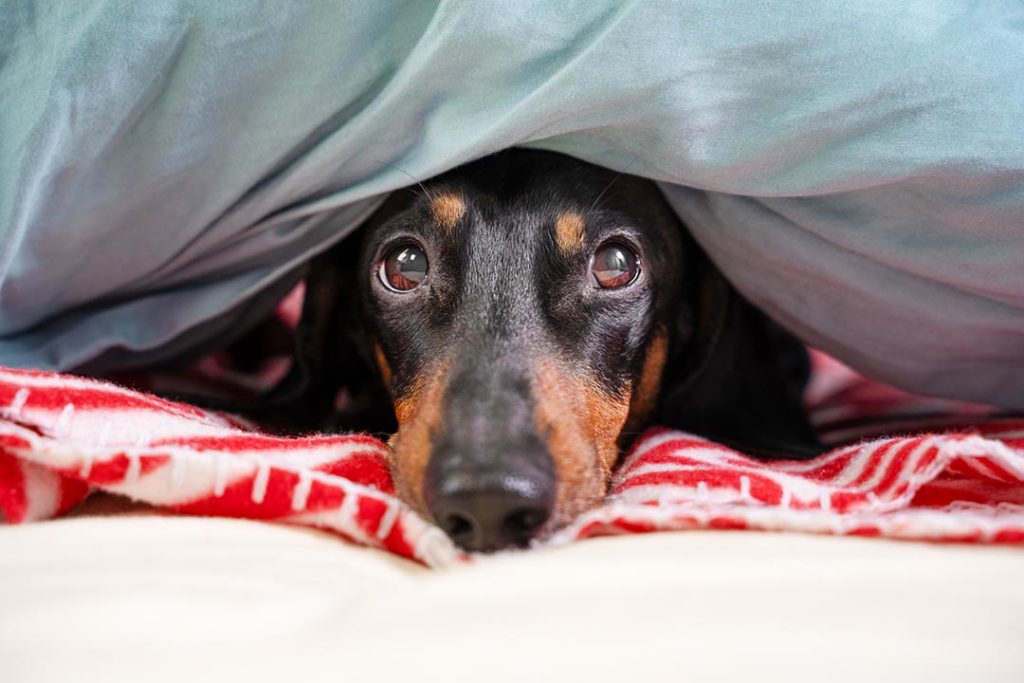A majority of dogs suffer from canine noise aversion. This condition is not rare. It can affect puppies, older dogs, and even cats, although the condition does have a different name when related to felines. Certain loud noises and pitches affect dogs by instilling fear and anxiety.
If your dog is suddenly fearful of a sound or sudden movement, it could be that they feel a canine noise aversion. An aversion is more severe than a small fear, though.

What is Canine Noise Aversion?
Did you know that more than one-third of dogs in the U.S feel fear and anxiety that drive panic attacks – all because of loud noises? It is common for dogs to panic or whine when they hear loud noises, especially if it is out of their control.
Noise anxiety or phobia, and fear or anxiety around certain noises, is an extreme medical case that can cause dogs to suffer over time. While canine noise aversion is not deadly, the quality of life of your dog does decrease. An example of this is fireworks. During the holidays, many dogs turn skittish when hearing loud explosions, music, and the commotion of people.
How Does Canine Noise Aversion Affect Dogs?
Canine noise aversion affects dogs in many ways. The main way it affects our furry friends is that it tears the familiar bonds between humans and dogs because of the noises. Most of the time, the noises are caused by the humans or owner, even unknowingly. Dogs with this type of aversion or avoidance disorder live with anxiety and fear.
Anxiety and fear are strong emotions that cause the body to react physically. For example, when a dog or a human feels anxiety, it is common to get ‘butterflies’ in their system. These butterflies are intense, and can lead to nausea, a loss of appetite, and overwhelming fear.
Anxiety and depression are two disorders tied closely together that do not discriminate and can develop in dogs. Noise phobia, along with anxiety and depression, is a long and never-ending cycle. If not treated, the nervousness causes vomiting, which can lead to worsening anxiety attacks.
The Causes of Canine Noise Aversion
The causes are still being studied for canine noise aversion. Although there are no concrete disorder causes, we do have some guesses. Experts in the veterinary science field believe that canine noise aversion is caused by a lack of habituation. In other words, if your dog is not used to loud noises, such as fireworks or thunder, this causes them to fear the new sounds.
Instead of avoiding the sounds altogether, it is not a bad idea to expose your dog to loud sounds. Many dog breeds are genetically prone to developing a general anxiety disorder. This general anxiety can shift to more developed and specific anxiety over noises.
The Diagnosis Process for Canine Noise Aversion
A large number of dogs are never diagnosed with canine noise aversion. Instead, the symptoms and signs are ignored or taken as to be ‘normal.’ Although being scared is a feeling that is normal when it is extreme and specifically attached to a sound, this is a phobia that requires treatment and counseling.
Go to the vet with verbal symptoms, and take videos of your pet reacting for your dog’s vet to see.
Treating Canine Noise Aversion
There is not a lot that you can do for dogs with canine noise aversion. There is no cure for this mental phobia. However, you can help your dog overcome it or at least keep calm enough to enjoy it. For example, the first thing you should do when your dog reacts to their noise phobia is to distract your dog from the noise.
Anytime the noise is loud and out, do not react to the noise, neither positively nor negatively. This teaches your dog that the noise is nothing to fear and that everything is okay. Once your dog sees you, their owner and their caretaker, are nervous, they think it is okay to feel the same way and that the noise is an issue.
You cannot treat this condition with a specific medication unless the anxiety and attacks are severe. These medications should be prescribed by the vet as they are strong. There are also different forms of exposure therapy for your dog to get used to the noises. You can try methods at home or go to the vet and experts.
Managing Canine Noise Aversion at Home
Even while receiving treatment, it is good to manage your dog’s anxiety and symptoms. Do this by creating a calming environment with their favorite items like their puppy blanket and toys. Spray lavender essential oils in the air as the scent has a calming factor. However, your dog should not ingest the oil.
Reach Out to Us If Your Dog is Suffering for Canine Noise Aversion
Overall, having a dog that suffers from canine noise aversion can be frustrating. This phobia or fear is extreme and causes reactions that affect both your dog’s physical body and mind.
To calm your puppy when they have these extreme doubts and pressures from anxiety, try to calm them with their favorite things. Experts recommend setting up a self-soothing corner for skittish dogs; that way, even when their owners are not directly with them, they can remain calm.
We’re here if you have any questions! Give Schertz Animal Hospital a call at (210) 659-0345.
Recent Posts
About Us
We know that choosing the right veterinarian for your pet (and you) can be a challenge. Yet, with our stress-free handling, our long-term, experienced staff, and a state-of-the-art facility, we make the decision an easy one!
